Marriage equality once again proposed in Navajo Nation bill

FARMINGTON, N.M. (AP) — Months after withdrawing legislation that proposed the Navajo Nation recognize marriage equality through repealing and amending tribal laws, a new bill is bringing back that recommendation.
The legislation seeks to end the ban on same-sex marriage under the Diné Marriage Act and repeal the section of the Navajo Nation Council resolution from 2005 that forbids couples of the same gender from marrying on the tribal land or having their marriage recognized.
The bill also proposes to amend other provisions in tribal law to conform with the repeal, including those that address spousal rights to property and employee benefits under the tribal government.
Delegate Eugene Tso recently introduced the legislation. It is now eligible for consideration by four standing committees, then the Navajo Nation Council.
Tso sponsored the previous bill but abruptly withdrew his sponsorship in April, citing the need to retool the legislation amid mixed reaction from delegates and the public.
In an interview with the Daily Times on July 1, Tso said he wants the bill to go to the council at the summer session.
That session starts July 18, but it is uncertain whether the bill will complete the legislative process by then. The first standing committee it was assigned to did not have a meeting scheduled this week, according to the Navajo Nation Council website.
“We’re talking about people ‐ they’re Navajos. They have census numbers too,” Tso said.
A census number is another term to describe the number assigned to a Navajo person after completing the enrollment process with the tribe’s vital records office.
“We can’t discriminate them for who they are and who we are. It’s bad to do that,” he said.
Tso, who represents Chinle Chapter in Arizona and is not seeking reelection this year, said he does not want the matter to be a referendum or be sidelined by delegates through a work session.
Since the interview was before Independence Day, Tso mentioned the holiday and described it as celebrating freedom and individual rights.
“We should understand that we’re changing. We’re no longer back in the ’40s, ‘30s or ’20s, we’re going forward. The LGBTQ, they like to enjoy life too,” Tso said.